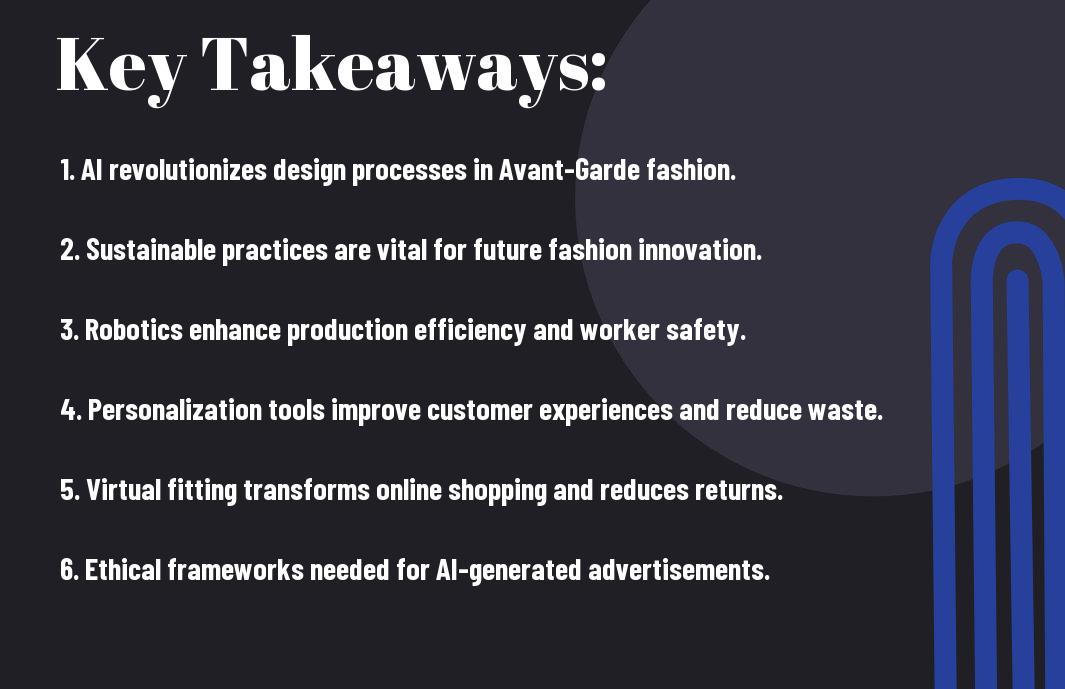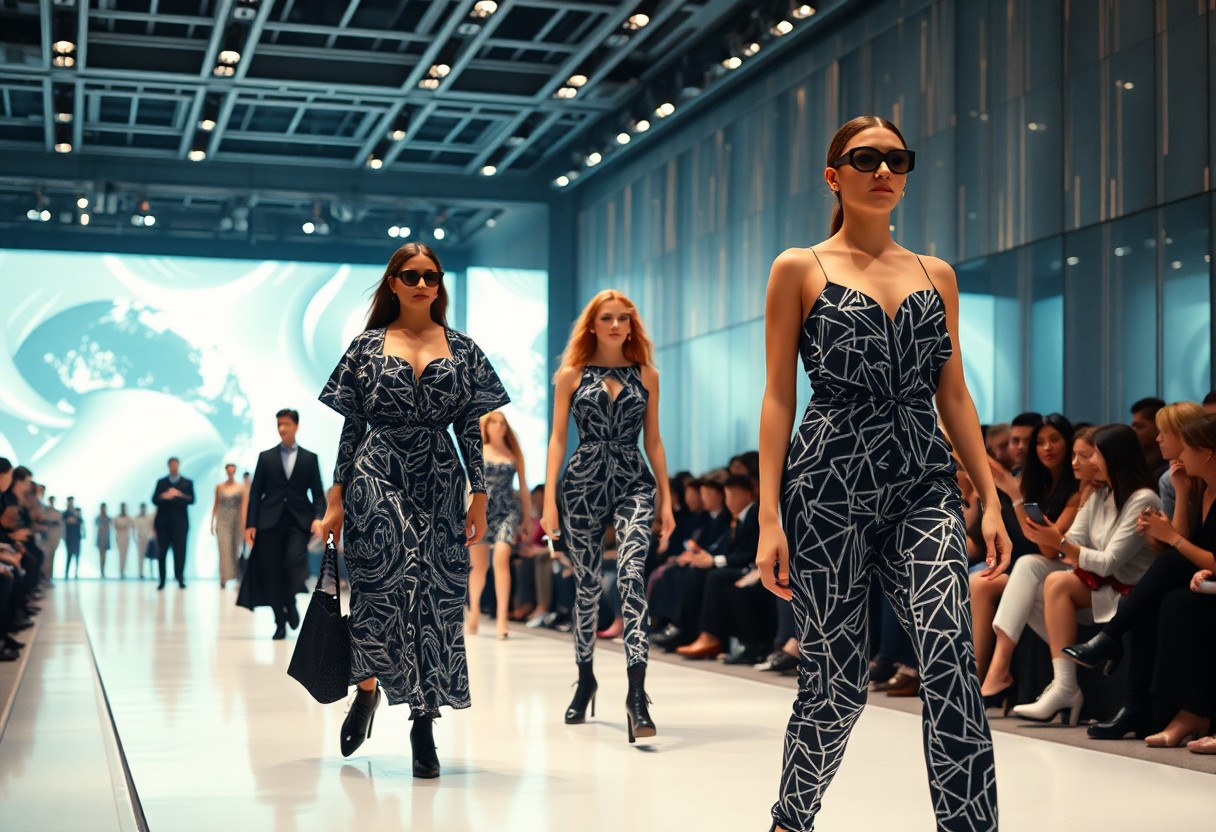20th Mar 2025
Designing Tomorrow: How AI is Shaping Avant-Garde Fashion

Fashion is undergoing a transformative evolution as artificial intelligence revolutionizes the way you engage with style, creativity, and sustainability. You’ll discover how AI not only enhances design processes but also addresses the industry's chronic issues like waste, unethical labor practices, and unrealistic beauty standards. As innovative technologies reshape production, you can expect a future where fashion is not only aesthetically groundbreaking but also responsible and ethical. Dive into how these advancements are paving the way for a new era in avant-garde fashion.

The Intersection of AI and Fashion
Your perception of fashion is evolving as artificial intelligence increasingly influences design, marketing, and production processes. The convergence of creativity and technology allows for innovative practices, pushing the boundaries of what fashion can achieve while addressing sustainability challenges. As AI reshapes the landscape, you can expect a future where design becomes more personalized, efficient, and aligned with ethical standards.
Technological Advancements in Design
Among the many ways AI is revolutionizing fashion design, automation and machine learning are helping to create responsive collections tailored to consumer preferences. Designers can analyze vast datasets to predict trends and optimize styles, thus ensuring that each piece resonates with your aesthetic desires while reducing waste in a traditionally resource-heavy industry.
The Role of Generative AI in Fashion Marketing
For brands in the fashion industry, generative AI presents an exciting opportunity to enhance customer engagement through personalized marketing strategies. By leveraging algorithms that analyze your shopping habits and preferences, companies can create tailored advertisements that appeal directly to you.
Role of generative AI in fashion marketing goes beyond mere aesthetics; it can significantly influence brand strategies and customer relationships. By producing hyper-personalized content, brands can boost engagement and conversion rates. However, this practice also raises ethical concerns, such as the potential for perpetuating unrealistic beauty standards through flawless AI-generated images. It's vital for the industry to balance these innovative marketing techniques with a commitment to authenticity and responsible representation to ensure a positive impact on consumer well-being. With the right approach, generative AI can become a powerful ally in shaping a more sustainable and ethical fashion landscape.

Sustainability Challenges in the Fashion Industry
One of the most pressing challenges in the fashion industry today is sustainability, which encompasses environmental degradation, unethical labor practices, and overwhelming waste. As you explore the integration of AI in fashion, it becomes important to consider how these technologies can address, rather than exacerbate, these systemic issues. The reliance on fast fashion and outdated manufacturing processes not only harms the planet but also affects the workers behind the seams.
Waste and Environmental Impact
The fashion industry generates approximately 20% of global wastewater and 10% of global carbon emissions, contributing to significant environmental harm. You should be aware that about 85% of textiles end up in landfills, and much of this clothing remains unworn. This alarming statistic highlights the need for revolutionary solutions to mitigate this waste crisis.
Ethical Labor Practices and Production Methods
Behind the glamour of fashion, the reality of unethical labor practices and poor working conditions persists, often overshadowed by the industry's focus on profit. Your awareness of these issues is crucial for fostering change. Many garments are still made under deplorable conditions, with workers often facing inadequate wages and unsafe environments.
Hence, adopting AI-powered manufacturing processes can fundamentally transform labor practices in the fashion industry. By prioritizing worker safety and embracing technology that favors ethical production, you can contribute to a shift toward more humane working conditions. Technologies that automate labor-intensive tasks can reduce dependency on cheap labor, ensuring that workers receive fair compensation and better working environments. Innovation here isn't just beneficial; it's vital for building a fashion landscape that respects both its workers and the planet. Embracing ethical practices can lead to a more responsible relationship between consumers and the fashion industry.
AI in Consumer Personalization
Once again, the fashion industry is evolving with the introduction of AI, making strides in enhancing consumer personalization. By leveraging machine learning algorithms, brands can analyze your preferences and shopping behaviors, allowing for tailored recommendations that resonate with your unique style. This personalized approach not only improves your shopping experience but also minimizes waste by suggesting garments you’re more likely to wear. The growing reliance on AI for inventory management further supports a sustainable approach, aligning with the industry's need to reduce its environmental impact.
Trends in Customized Fashion Solutions
With the rise of AI in fashion, customized solutions are becoming more prevalent. Companies are now utilizing advanced algorithms to create personalized collections based on your style, size, and preferences. This not only streamlines your shopping experience but also fosters a stronger connection to the brands you choose. AI-driven data insights are paving the way for unique designs tailored specifically to fit your individual tastes.
The Future of Virtual Try-Ons and Fitting
At the forefront of fashion innovation is the future of virtual try-ons and fitting, where technology plays a pivotal role in enhancing your purchasing decisions. By harnessing augmented reality, you can visualize how garments fit your body without stepping into a fitting room. This technology, which makes use of your phone's LiDAR capabilities, could revolutionize your shopping habits, ensuring you find clothes that fit perfectly.
Trends show that virtual try-ons are set to become *mainstream*, transforming the way you shop for clothes. With real-time fitting capabilities, you can experience *tailored adjustments* before you even click "buy." This innovative approach aims to *reduce returns*, which account for a large percentage of waste in the fashion industry. By helping you find the perfect fit every time, virtual try-ons promote a sustainable shopping experience while addressing the environmental impact of excess clothing production. As technology advances, staying attuned to these developments will enhance not only your wardrobe but also the future of fashion.
Innovations in Material Science
Unlike traditional methods that rely on finite resources and unsustainable practices, material science innovations driven by AI are transforming the fashion landscape. By leveraging cutting-edge technologies, you can now expect fabrics that are not only more durable and functional but also more environmentally friendly. The integration of AI enables the creation of textiles that reduce waste and consumption, paving the way for a sustainable future in fashion.
Developing Sustainable Fabrics through AI
Material innovations are at the forefront of fashion's evolution, thanks to AI's capabilities. With advanced algorithms, you can develop sustainable fabrics that require fewer resources to produce while maintaining high-quality standards. These new materials often incorporate recycled fibers and bio-based alternatives, replacing conventional textiles that contribute to pollution and waste.
3D Printing and On-Demand Manufacturing
An exciting frontier in fashion is 3D printing, which enables you to access on-demand manufacturing directly. This technology allows for the creation of unique, custom designs without the excess inventory typically associated with traditional production methods. By producing only what you need, you actively contribute to minimizing waste and significantly lowering carbon emissions.
Innovations in 3D printing and on-demand manufacturing are reshaping how you engage with fashion. With this technology, garments can be produced on a localized scale, using recycled materials as raw inputs. This approach minimizes the environmental footprint of transportation and production while ensuring that you have access to customized products that meet your specific needs. As a result, the fashion industry can significantly reduce the 85% of textiles that end up in landfills, creating a more sustainable ecosystem while enhancing your shopping experience.

Addressing Body Image Issues
After years of perpetuating unrealistic standards, the fashion industry faces a critical turning point in how it approaches body image. With the rise of AI, there is potential to challenge these dated ideals and promote a more inclusive representation of beauty that reflects the diversity found in society today. As you engage with fashion, it’s vital to consider how these technologies can reshape perceptions and foster a healthier understanding of self-image.
AI's Role in Challenging Beauty Standards
At the forefront of this transformation, AI offers innovative tools to create beauty that celebrates individuality rather than conformity. By generating a wider variety of body shapes and sizes in marketing campaigns, AI can help dismantle the narrow perceptions that have long dominated the industry.
Creating Positive Narratives in Fashion
Fashion is increasingly encouraged to embrace positive narratives, moving away from harmful depictions that contribute to body dysmorphia. As you navigate this evolving landscape, brands are adopting messaging that focuses on inclusivity and self-acceptance, promoting slogans like "Love Your Boobs" to foster healthier body image discussions. This shift encourages brands to prioritize authentic representations, thereby empowering you and others to feel seen, respected, and valued. Furthermore, with AI helping to tailor experiences that resonate with diverse audiences, the fashion industry can become a space where you see fashion as a celebration of real beauty rather than a relentless pursuit of unattainable perfection.
And by prioritizing body positivity in their campaigns, brands are paving the way for a new narrative that emphasizes acceptance and diversity. This not only counters the impact of Photoshopped imagery but also supports a culture where your uniqueness is recognized and appreciated. With AI facilitating this transformation, it's clear that the future of fashion holds the promise of inclusivity, allowing you to embrace your individuality without fear.
The Future Landscape of Fashion with AI
All eyes are on the evolution of fashion as AI technology redefines the industry. From virtual try-ons to automated manufacturing, you're witnessing a transformative period where sustainability and efficiency become paramount. The integration of AI can help mitigate the significant waste generated by fashion, currently accounting for about 20% of global wastewater and 10% of carbon emissions. It's a landscape where innovation meets responsibility, paving the way for a more ethical approach to style.
The Shift Towards Responsible Fashion
Responsible fashion is rapidly becoming a priority as you navigate a marketplace increasingly influenced by sustainability. With the environmental impact of the fashion industry evident, brands are now turning to AI to minimize waste by predicting trends and optimizing inventory. This technology not only drives efficiency but also raises awareness about ethical manufacturing, encouraging you to make more informed purchasing decisions.
Predictions for the Fashion Industry
Beside the advancements in production processes, you're set to see a wave of innovation shaped by AI in fashion design and marketing.
Towards a more sustainable future, AI is expected to revolutionize the way garments are produced, using renewable energy and materials that prioritize environmental responsibility. Expect to find personalized production methods through 3D printing and AI-driven design, leading to less waste and more durable clothing options. As the industry aims to replace fast fashion with thoughtful consumption, you will have access to a fashion landscape that not only highlights your style but also reflects a commitment to sustainability and ethical practices.
Designing Tomorrow: How AI is Shaping Avant-Garde Fashion
Following this journey into the evolving landscape of fashion, you can see how AI technology is redefining design, efficiency, and sustainability. By embracing these innovations, your engagement with fashion can shift towards a more responsible narrative that celebrates creativity while addressing pressing environmental and ethical concerns. As AI continues to shape avant-garde fashion, you stand at the forefront of this transformation, inspiring a future where style and responsibility coexist harmoniously.
